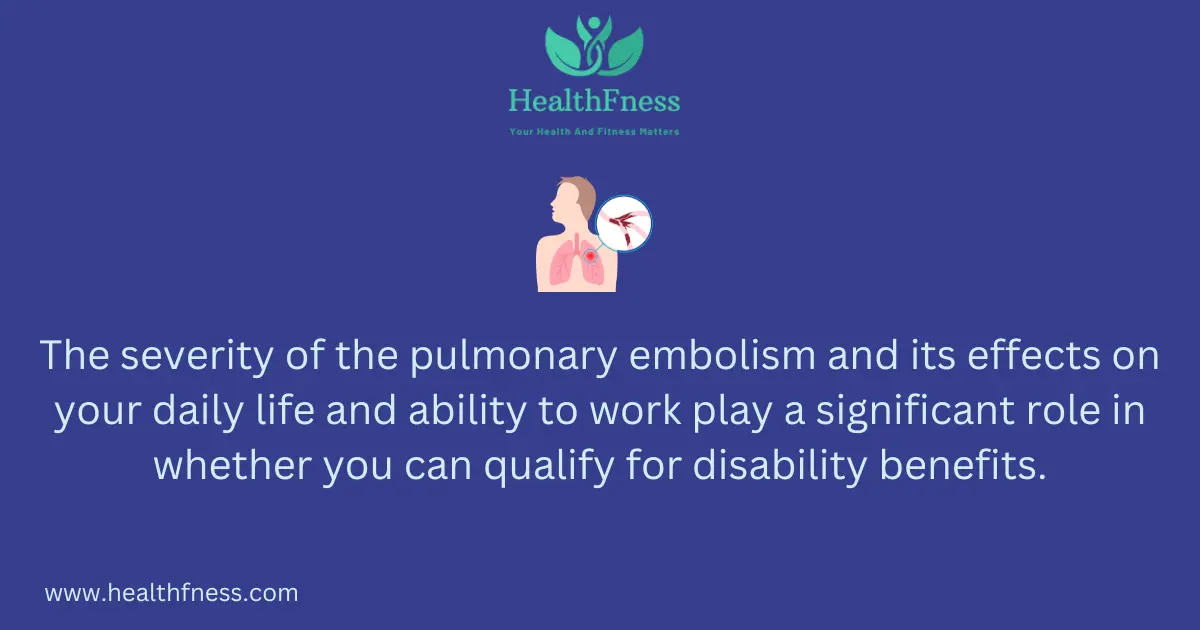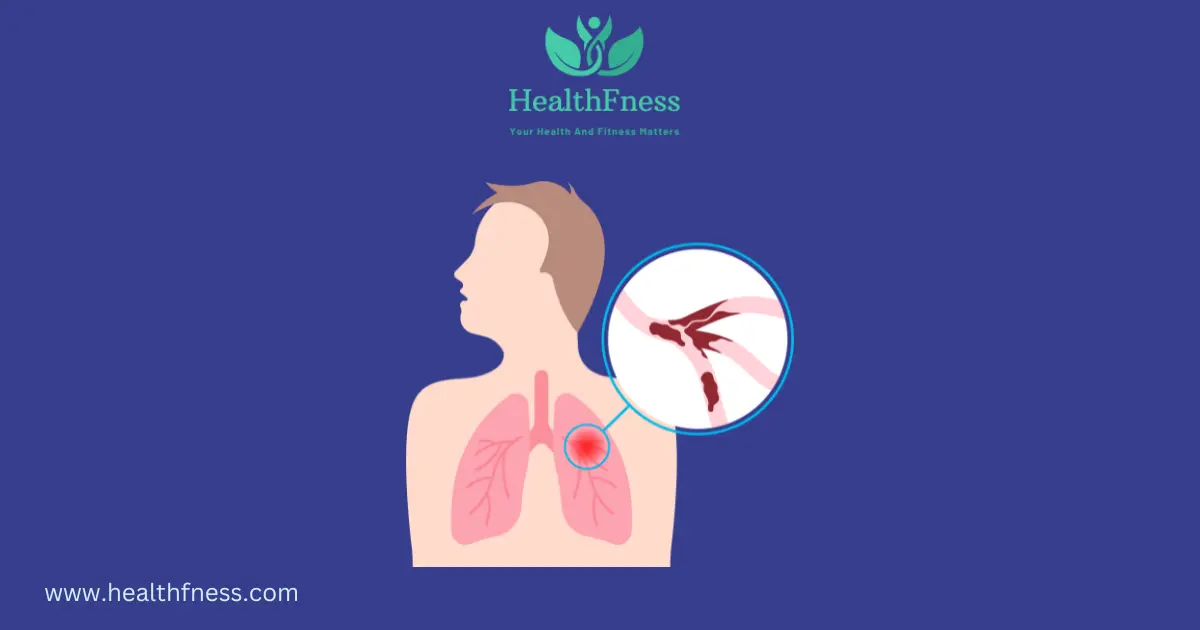In a world where health issues can frequently cause financial worries, it’s critical to know “if you can obtain disability benefits for specific medical conditions.” Pulmonary embolism is one such illness that brings concern.
In this comprehensive guide, we will delve into the different “features of pulmonary embolism, its signs, causes, treatments, and the potential for getting disability benefits for pulmonary embolism”.
So, can you get disability for pulmonary embolism? Let’s explore this question in detail.
Life is a journey that must be traveled no matter how bad the roads and accommodations.
What Is Pulmonary Embolism?
Sudden blockage of one or more pulmonary arteries is a hallmark of the dangerous medical illness known as pulmonary embolism.
Blood clots that have traveled from other anatomical locations, most frequently from the lower limbs, usually cause these obstructions. These emboli cause a significant obstruction to the circulatory system as they enter the pulmonary area, which could have serious implications.
Recognizing Pulmonary Embolism
Exploring Its Causes, Signs, and Potential Consequences:
It is compulsory to engage in a thorough investigation of the beginning, clinical signs, and probable consequences of pulmonary embolism in order to get a comprehensive understanding of the intricacies of the condition.
You May Also Like To Read: Pulmonary Vein Stenosis: Causes, Symptoms and Treatment 2023
Pulmonary Embolisms Symptoms and Indications
Some of the usual signs and symptoms of a pulmonary embolism include feeling breathless, tightness in the chest area, bleeding, and a faster heart rate. To quickly recognize them and seek emergency medical attention, it is crucial to understand their signs.
Understanding such signs is essential for timely detection and prompt medical attention.
A Pulmonary Embolism’s stubbornness can be Determined By
The long-term effects of lung embolisms cover a wide range of variations, from mild to quite serious. The severity of this condition changes significantly depending on factors such as the size of the embolus and the person’s overall health.
Common Pulmonary Embolism Incidents Etiologies
Most common, thrombi that begin in other parts of the body migrate and cause pulmonary embolism. However, a number of contributing factors including surgical operations, protracted periods of physical immobility, and particular medical conditions, significantly increase the risk of experiencing these thrombotic episodes.
How to Avoid a Pulmonary Embolism
Avoidance is always better to cure.
We’ll talk about safeguards and way-of-life modifications that can help lower the risk of an embolism in the lungs(Pulmonary Embolism).
Can You Get Disability for Pulmonary Embolism?
Yes, you can potentially qualify for disability benefits because of pulmonary embolism.But this is noy obvious it depends on the severity and impact of the condition on your ability to work and how your life is affected.
Their is criteria for the person which will be able to get diability benefits.
To qualify for disability benefits, including Social Security Disability Insurance (SSDI) or Supplemental Security Income (SSI) in the United States, your condition must meet the criteria outlined by the Social Security Administration (SSA).
Here you can read their guidelines/criteria
Disability Evaluation Under Social Security: 3.00 Respiratory Disorders – Adult

You May Also Like To Read: Ground Glass Nodule: The Hidden Danger in Your Lungs
Are Vascular Blockages Covered By Disability Insurance?
Vascular blockages, including conditions like pulmonary embolism, may be covered by disability insurance if they significantly impair your ability to work. However, coverage and eligibility depend on the specific terms and conditions of your disability insurance policy.
Can Blood Clots Lead to Short-Term Disability?
Yes, blood clots can lead to short-term disability if they significantly impair your ability to work for a temporary period. Short-term disability insurance typically covers conditions that result in a temporary inability to work due to illness or injury, including those caused by blood clots such as pulmonary embolism or deep vein thrombosis (DVT).
For detailed information click here.↗
When to Return to Work After Pulmonary Embolism
Finding the best time to return to work after suffering from a pulmonary embolism might be a difficult decision to make. We will provide advice on how to choose this crucial intersection wisely and securely down below.
A Pulmonary Embolism’s Effects
The effects of pulmonary embolism can significantly affect somebody’s health and quality of life if they are ignored or ignored. It is essential for anyone who has battled with this condition or who is at risk to understand the severity of these effects.
Long Lasting Effects of Pulmonary Embolism
Pulmonary embolism has the potential to impair the pulmonary system on occasion, which could lead to a reduction in lung capacity. This can therefore lead to chronic breathing problems, especially when engaging in physically demanding activities.
.Continuous Fatigue: One common side effect of managing a pulmonary embolism is a chronic state of weakness, which can seriously limit everyday function and output.
.Mental Effects: Dealing with an illness that could be fatal can have an enormous psychological effect and cause worry.
.Reduced Lung Function: Pulmonary embolism can occasionally damage the lungs, which can result in diminished lung function. This may lead to prolonged breathlessness, especially when engaging in strenuous activity. For more information read this PubMed – Pulmonary Embolism Research↗
Medical Compatibility Pulmonary Embolism
It’s important to follow the directions on any prescriptions for blood thinners or other medications that your doctor has given you. These drugs lower the chance of getting blood clots and pulmonary embolisms again.
Changes In Lifestyle For Overcome Risk Of Pulmonary Embolism
Compression Stockings
In some circumstances, medical professionals may advise wearing compression stockings to enhance blood circulation in the legs.
Avoid Prolonged Immobility
If your job or way of life requires you to spend a lot of time sitting or standing, take regular breaks and move around.
Maintain a Healthy Weight
Blood clot risk is higher in people who are overweight or obese. Having a healthy weight and keeping it off can be beneficial.
Water Intake
Maintaining a healthy water intake might help keep blood from getting overly thick and prone to clotting.
FAQS
How Serious Is a Pulmonary Embolism?
Pneumonary embolism can be fatal, so it must be treated seriously.
Does Pulmonary Embolism Concern Me?
While being aware of the hazards is important, worrying excessively is counterproductive. Instead, emphasize early detection and prevention.
Is Blood Clots Considered a Disability?
Blood clots can be considered a disability if they significantly impact your ability to work. Consult with a disability expert for guidance.
How Long Does a Pulmonary Embolism Survive?
While the survival rate for pulmonary embolism changes many patients make a full recovery with immediate medical attention.
Is a Normal Life Possible After a Pulmonary Embolism?
After recovery from a pulmonary embolism, many people can go back to their normal lifestyles, but its compulsory to discuss with doctor.
Do the majority of Pulmonary Embolism victims survive?
Most people have a good chance of surviving a pulmonary embolism with early medical attention
What Symptoms Show a Pulmonary Embolism?
Breathlessness, chest pain, and fever are all warning indications of pulmonary Embolism
What is Important Medical Records for My Disability Claim?
It is crucial to gather thorough medical evidence to support your pulmonary embolism-related disability claim. This dossier needs to include a wide range of evidence that demonstrates how serious your condition is.
Conclusion
Despite the fact that pulmonary embolism can leave behind long-lasting effects, immediate medical attention, lifestyle changes, and preventive steps can greatly enhance recovery and lower the chance of recurrence.
For specific advice, speak with a healthcare professional if you are worried about pulmonary embolism or its possible long-term effects. To sum up, pulmonary embolism is a medical condition that needs our understanding and undivided care.
It is possible for thrombi, which frequently start in the lower limbs and move into the lungs, to cause this potentially fatal condition by limiting circulatory function. We have discussed the causes, signs, symptoms, clinical indicators, treatment options, and chances of obtaining benefits for pulmonary embolism-related disability in this discourse.

Dr. Mark Jenkins, MD - General Physician (California, USA)
Dr. Mark Jenkins is a board-certified general physician based in the United States, specializing in preventive medicine, nutrition, and lifestyle health. With years of clinical experience in primary care, he is dedicated to helping patients and readers alike make informed, science-based decisions about their well-being.
As a trusted medical reviewer and contributor to Healthfness.com, Dr. Jenkins ensures that all health content meets the highest standards of accuracy, safety, and evidence-based medicine. His expertise bridges modern medical science with practical, everyday wellness strategies, making complex topics approachable for all audiences.
Outside the clinic, Dr. Jenkins is passionate about living the healthy lifestyle he teaches. He enjoys hiking with his dog, experimenting with vegetarian cooking, and exploring the latest health research. He believes that small, consistent lifestyle changes lead to lasting health improvements, and he aims to inspire readers to take proactive steps toward a healthier, happier life.
Explore more of Dr. Jenkins’ evidence-based insights at Healthfness.com




